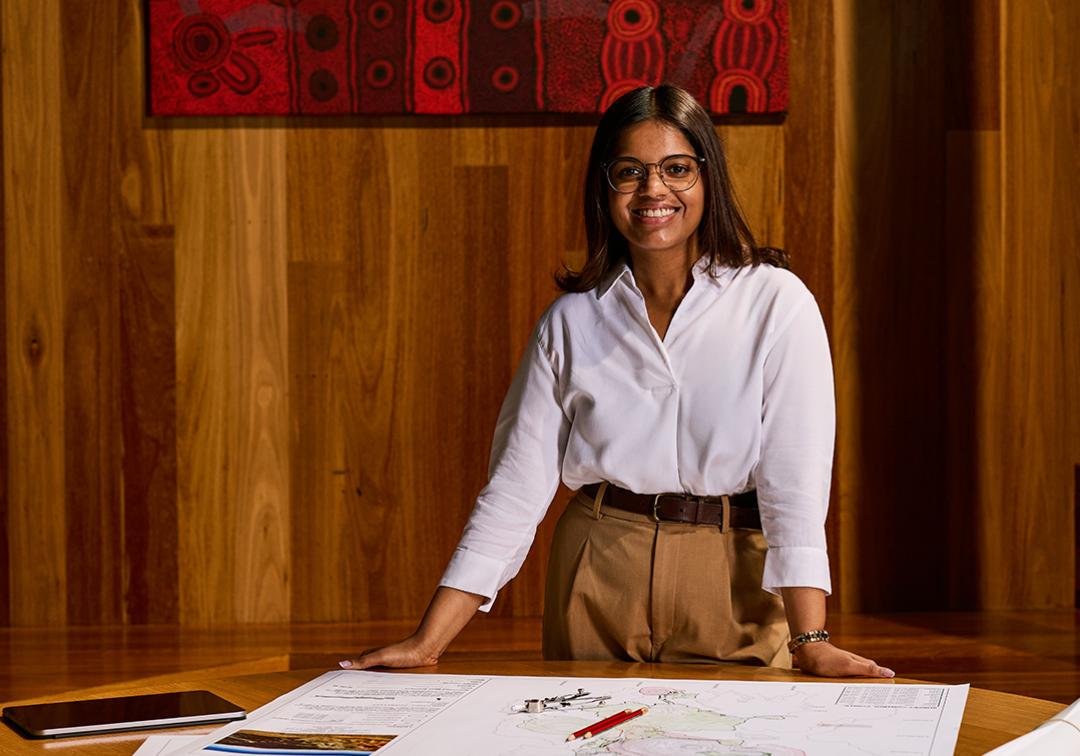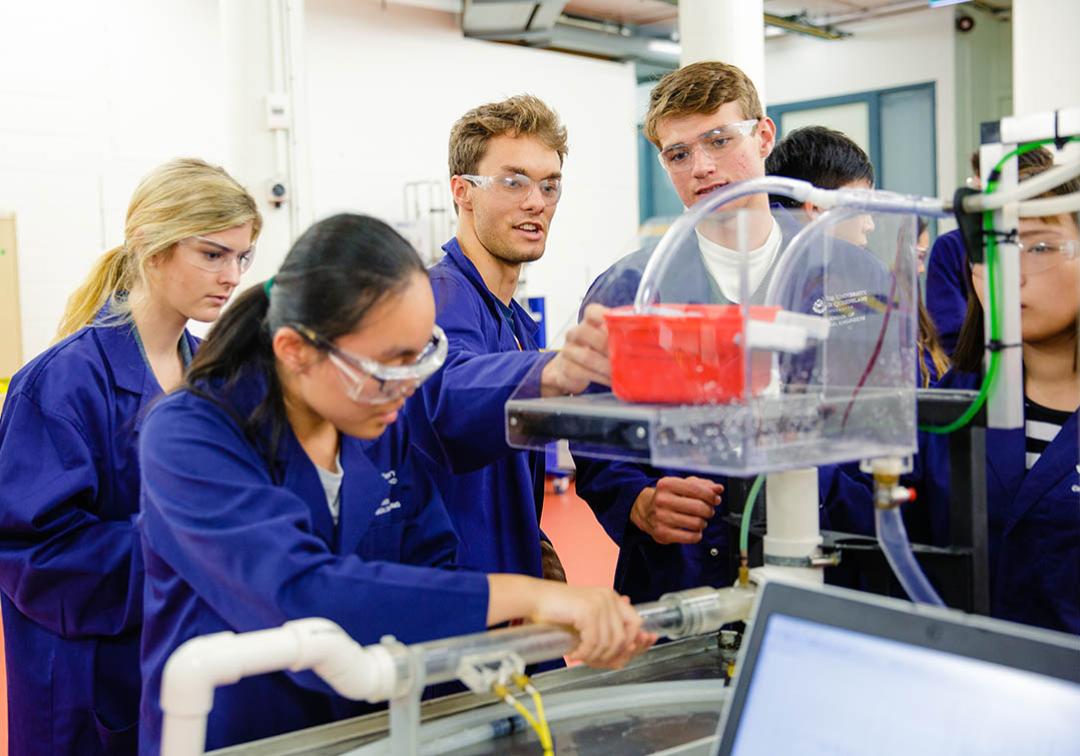
Graduate Certificate in Resource Development
Overview
Gain the knowledge and skills needed to tackle growing challenges facing the resources sector while opening up new opportunities for career advancement.
Whether you’re considering a career change to move into the mining industry or looking to deepen your expertise in your current role, our programs will prepare you for the future.
This 1-year, part-time Graduate Certificate is co-designed by industry experts and taught by leading academics. It will provide you with the practical understanding and robust skills to make meaningful contributions to the health and sustainability of the sector.
Courses contributing to the Graduate Certificate in Resource Development (Mining Foundations) offer flexible on-campus and online delivery options, so you will have the flexibility to structure your studies around your work commitments. Courses contributing to the Graduate Certificate in Resource Development (Mining Operations) offer an online program with an intensive study period held in Brisbane.
The Mining Foundations field of study is a pathway for professionals who have studied other engineering specialisations or technical disciplines to transition to roles in the resources sector.
The Mining Operations field of study provides an opportunity for professionals who have completed studies in mining or other engineering specialisations, or in technical disciplines who have worked in the resources sector and applied this knowledge within the context of an operational mine site.
Program highlights
- New in 2025.
- Flexible on-campus and online delivery options, allowing you to study around your work commitments.
- Co-designed with industry professionals.
How you'll learn
Your learning experiences are designed to best suit the learning outcomes of the courses you choose.
- Lectures
- Online study
- Workshops
What you'll study
At UQ, degrees are called 'programs' and subjects are called 'courses'. Here's a sample of the courses you could study in this program:
- Integrated Orebody Knowledge
- Applied Mining Geomechanics
Career possibilities
Postgraduate study can take you anywhere. Here are some of the careers you could be on your way to:
- Mining adviser
- Mineral exploration consultant
- Engineering manager
- Mining engineer
- Mining Technologist/Associate
- Mine geotechnical engineer
- Drill and blast engineer
- Mine planning engineer
- Short-term planner
- Mine production engineer
Events
See all events
29 June - 6 July
Year 11 Queensland Chemistry Winter School

29 June
Queensland Biology Winter School, Year 12

1 July
International Baccalaureate Research Skills Program
Stories
See all stories
Uni life
What’s it like to study resource development (mining) as a postgraduate?
6-minute read

Study tips
UQ science scholarships to help fund your studies
8-minute read
Stories
See all stories
Uni life
What’s it like to study resource development (mining) as a postgraduate?
6-minute read

UQ people
From firefighting robots to rocket science: Vennkkata’s UQ experience
5-minute read

Study tips
UQ science scholarships to help fund your studies
8-minute read
Entry requirements
Entry requirements
To be eligible for entry, you'll need:
- a bachelor's degree (or equivalent) in a relevant discipline (see below), or
- for the Mining Foundations field of study only, to have completed 2 years full-time, post-secondary studies, plus 2 years full-time equivalent, relevant work experience (see below). Applications based on post-secondary study and/or work experience will be assessed individually.
- a bachelor's degree (or equivalent) in a relevant discipline (see below), or
- for the Mining Foundations field of study only, to have completed 2 years full-time, post-secondary studies, plus 2 years full-time equivalent, relevant work experience (see below). Applications based on post-secondary study and/or work experience will be assessed individually.
Relevant disciplines for previous qualifications
Relevant disciplines depend on the field of study you intend to choose.
For the Mining Foundations field of study, relevant disciplines include geology sciences, earth sciences, environmental sciences, surveying, spatial science or an engineering field other than mining.
For the Mining Operations field of study, relevant disciplines include mining engineering.
Relevant work experience
For the Mining Foundations field of study, the relevant work experience includes 2 years of work in a relevant engineering environment. This will need to be supported with evidence.
Evidence of relevant work experience should include a letter from your employer (and/or previous employers) clearly stating the following:
- That you work (or worked) within the specified organisation
- The nature of your work, detailing any relevant duties and responsibilities to the entry criteria above
- The length of time you were in your role/s (i.e. demonstrating minimum length for entry) and whether this was full-time, part-time, or casual
- Any further bespoke conditions listed by the entry criteria
Letters will typically be expected to be presented on company letterhead and signed by a manager or HR representative. A CV or resume is not a sufficient document on its own and must be accompanied by a supporting letter as described above.
All applications based on work experience are subject to an individual assessment.
Related programs
Depending on your previous qualifications and current goals, you might want to consider
one of these related programs:
Student visas
This program does not meet the eligibility requirements for an Australian Student visa (subclass 500).
To study this program in Australia you will need a temporary visa or residency status with study entitlement. Some programs can also be studied from outside Australia.
Fees and Scholarships
Indicative annual fee
Approximate yearly cost of tuition (8 units). Your fees will vary according to your study load. Fees are reviewed each year and may increase.
$20,392
2026
Government assistance
Financial aid
As an international student, you might be eligible for financial aid – either from your home country, or from the Australian Government.
FEE-HELP
Domestic students who are accepted into the Graduate Certificate in Resource Development pay tuition fees.
FEE-HELP is an Australian Government loan scheme to assist eligible students with the cost of their tuition fees.
Centrelink support
The Australian Government offers a number of income-support payments to eligible Australian university students.
Scholarships
You may be eligible for more than 100 scholarships, including:
How to apply
Applying online
All international applications should be submitted to UQ. The program code for the Graduate Certificate in Resource Development is 5773.
International students who want to study this program will not be eligible for a Student Visa (subclass 500).
To study this program in Australia, you will need an Australian visa or residency status with sufficient study entitlement. Some programs can also be studied from outside Australia.
Applying online
All domestic applications should be submitted to UQ.
The program code for the Graduate Certificate in Resource Development is 5773.
Important dates
The closing date for this program is:
Visa processing times vary. Apply and accept your offer as early as you can.
To learn more about UQ dates, including semester start dates, view the Academic Calendar.
Important dates
The closing date for this program is:
- To commence study in Semester 1 - January 31 of the year of commencement.
- To commence study in Semester 2 - June 30 of the year of commencement.
To learn more about UQ dates, including semester start dates, view the Academic Calendar.
Aboriginal and Torres Strait Islander applicants
For support with applying – or if you have any questions about university life – get in touch with our Aboriginal and Torres Strait Islander Studies (ATSIS) Unit.
Explore other programs
Express yourself. And your interest.
They say choosing a degree is hard, which is why we've made it easy. Register your interest and we'll send you everything you need to know about applying to UQ.


